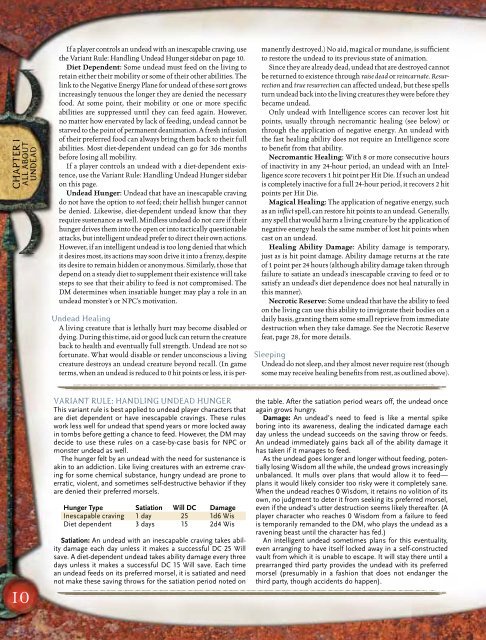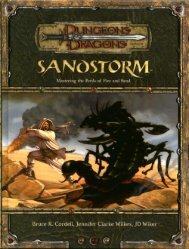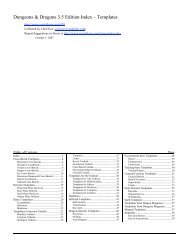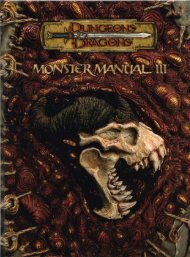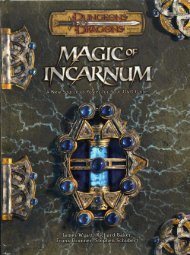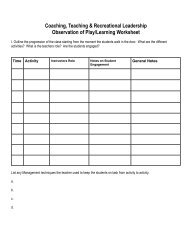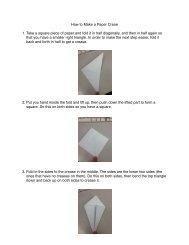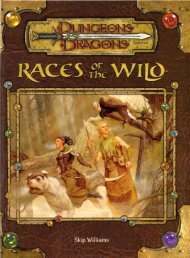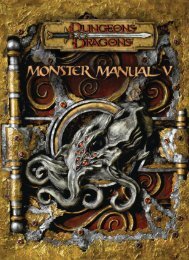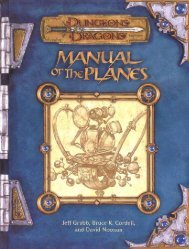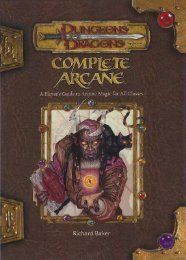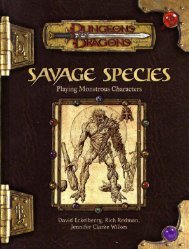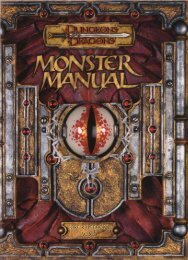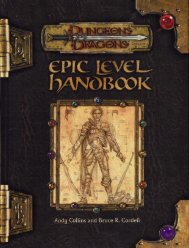CHAPTER 1ALL ABOUTUNDEAD10If a player controls an undead with an inescapable craving, usethe Variant Rule: Handling <strong>Undead</strong> Hunger sidebar on page 10.Diet Dependent: Some undead must feed on the living toretain either their mobility or some <strong>of</strong> their other abilities. <strong>The</strong>link to the Negative Energy Plane for undead <strong>of</strong> these sort growsincreasingly tenuous the longer they are denied the necessaryfood. At some point, their mobility or one or more specificabilities are suppressed until they can feed again. However,no matter how enervated by lack <strong>of</strong> feeding, undead cannot bestarved to the point <strong>of</strong> permanent deanimation. A fresh infusion<strong>of</strong> their preferred food can always bring them back to their fullabilities. Most diet-dependent undead can go for 3d6 monthsbefore losing all mobility.If a player controls an undead with a diet-dependent existence,use the Variant Rule: Handling <strong>Undead</strong> Hunger sidebaron this page.<strong>Undead</strong> Hunger: <strong>Undead</strong> that have an inescapable cravingdo not have the option to not feed; their hellish hunger cannotbe denied. Likewise, diet-dependent undead know that theyrequire sustenance as well. Mindless undead do not care if theirhunger drives them into the open or into tactically questionableattacks, but intelligent undead prefer to direct their own actions.However, if an intelligent undead is too long denied that whichit desires most, its actions may soon drive it into a frenzy, despiteits desire to remain hidden or anonymous. Similarly, those thatdepend on a steady diet to supplement their existence will takesteps to see that their ability to feed is not compromised. <strong>The</strong>DM determines when insatiable hunger may play a role in anundead monster’s or NPC’s motivation.<strong>Undead</strong> HealingA living creature that is lethally hurt may become disabled ordying. During this time, aid or good luck can return the creatureback to health and eventually full strength. <strong>Undead</strong> are not s<strong>of</strong>ortunate. What would disable or render unconscious a living Sleepingcreature destroys an undead creature beyond recall. (In game <strong>Undead</strong> do not sleep, and they almost never require rest (thoughterms, when an undead is reduced to 0 hit points or less, it is per-some may receive healing benefits from rest, as outlined above).pqqqqqqqqqqqqqqqqqqqqrsmanently destroyed.) No aid, magical or mundane, is sufficientto restore the undead to its previous state <strong>of</strong> animation.Since they are already dead, undead that are destroyed cannotbe returned to existence through raise dead or reincarnate. Resurrectionand true resurrection can affected undead, but these spellsturn undead back into the living creatures they were before theybecame undead.Only undead with Intelligence scores can recover lost hitpoints, usually through necromantic healing (see below) orthrough the application <strong>of</strong> negative energy. An undead withthe fast healing ability does not require an Intelligence scoreto benefit from that ability.Necromantic Healing: With 8 or more consecutive hours<strong>of</strong> inactivity in any 24-hour period, an undead with an Intelligencescore recovers 1 hit point per Hit Die. If such an undeadis completely inactive for a full 24-hour period, it recovers 2 hitpoints per Hit Die.Magical Healing: <strong>The</strong> application <strong>of</strong> negative energy, suchas an inflict spell, can restore hit points to an undead. Generally,any spell that would harm a living creature by the application <strong>of</strong>negative energy heals the same number <strong>of</strong> lost hit points whencast on an undead.Healing Ability Damage: Ability damage is temporary,just as is hit point damage. Ability damage returns at the rate<strong>of</strong> 1 point per 24 hours (although ability damage taken throughfailure to satiate an undead’s inescapable craving to feed or tosatisfy an undead’s diet dependence does not heal naturally inthis manner).Necrotic Reserve: Some undead that have the ability to feedon the living can use this ability to invigorate their bodies on adaily basis, granting them some small reprieve from immediatedestruction when they take damage. See the Necrotic Reservefeat, page 28, for more details.VARIANT RULE: HANDLING UNDEAD HUNGERThis variant rule is best applied to undead player characters thatare diet dependent or have inescapable cravings. <strong>The</strong>se ruleswork less well for undead that spend years or more locked awayin tombs before getting a chance to feed. However, the DM maydecide to use these rules on a case-by-case basis for NPC ormonster undead as well.<strong>The</strong> hunger felt by an undead with the need for sustenance isakin to an addiction. Like living creatures with an extreme cravingfor some chemical substance, hungry undead are prone toerratic, violent, and sometimes self-destructive behavior if theyare denied their preferred morsels.Hunger Type Satiation Will DC DamageInescapable craving 1 day 25 1d6 WisDiet dependent 3 days 15 2d4 Wisthe table. After the satiation period wears <strong>of</strong>f, the undead onceagain grows hungry.Damage: An undead’s need to feed is like a mental spikeboring into its awareness, dealing the indicated damage eachday unless the undead succeeds on the saving throw or feeds.An undead immediately gains back all <strong>of</strong> the ability damage ithas taken if it manages to feed.As the undead goes longer and longer without feeding, potentiallylosing Wisdom all the while, the undead grows increasinglyunbalanced. It mulls over plans that would allow it to feed—plans it would likely consider too risky were it completely sane.When the undead reaches 0 Wisdom, it retains no volition <strong>of</strong> itsown, no judgment to deter it from seeking its preferred morsel,even if the undead’s utter destruction seems likely thereafter. (Aplayer character who reaches 0 Wisdom from a failure to feedis temporarily remanded to the DM, who plays the undead as aravening beast until the character has fed.)An intelligent undead sometimes plans for this eventuality,even arranging to have itself locked away in a self-constructedvault from which it is unable to escape. It will stay there until aprearranged third party provides the undead with its preferredmorsel (presumably in a fashion that does not endanger theSatiation: An undead with an inescapable craving takes abilitydamage each day unless it makes a successful DC 25 Willsave. A diet-dependent undead takes ability damage every threedays unless it makes a successful DC 15 Will save. Each timean undead feeds on its preferred morsel, it is satiated and neednot make these saving throws for the satiation period noted on third party, though accidents do happen).pqqqqqqqqqqqqqqqqqqqqrs
However, undead that cast spells require some time to refreshtheir consciousness, just as living spellcasters do, before theycan prepare or cast new spells.To regain the ability to cast or prepare daily spells, an undeadmust have a clear mind. To clear its mind, the undead mustexperience 8 hours <strong>of</strong> restful calm—it must refrain from movement,combat, spellcasting, skill use, conversation, or any otherdemanding physical or mental task during the rest period. Ifthe restful calm is interrupted, each interruption adds 1 hourto the total amount <strong>of</strong> time the undead has to rest in order toclear its mind.UNDEAD PROPAGATIONMany undead share at least one characteristic with living creatures—theypossess the means to propagate their own kind.Several varieties <strong>of</strong> undead can cause their slain victims to risefrom the grave, thereby creating new unliving creatures.Creating <strong>Undead</strong> Spawn: Many undead have the ability tocreate spawn (an equal or lesser version <strong>of</strong> themselves, but undertheir control) simply by slaying their victims. Presumably, theundead must have drained at least one <strong>of</strong> the victim’s abilityscores or bestowed at least one negative level for this death tooccur. (For instance, a wight that pushes a gravestone over on anenemy, killing it, shouldn’t expect to gain a new wight servantfrom the victim’s remains.)Taking a broader view, undead propagation might be regardedas an infectious disease: It is nasty, it is easily spread, and it killsits hosts. Of course, the plague <strong>of</strong> self-propagating undead isfar worse than any common disease (especially since normalmethods for preserving oneself against disease are useless inthis case), but the cure is little different—eliminate the source<strong>of</strong> infection, and you eliminate the malady itself.<strong>The</strong> unliving make use <strong>of</strong> several different methods to createnew undead creatures. <strong>The</strong>se methods, and the creatures thatemploy them, are summarized in Table 1–2.Table 1–2: <strong>Undead</strong> PropagationMethodCreatures That Use ItDrainBle akborn*, blood amniote*,shadow, vampire, wraithKill victim with ability Bodak, forsaken shell*DiseaseGhast, ghoul, lacedonEnergy drainCry pt chanter*, slaughter wight*,spectre, vampire, wightMagical creation Lich, mummy, skeleton, zombieSplitDream vestige*, skin kite**New monster described in Chapter 6.Prevention <strong>of</strong> Unlife: Those who hope to escape the curse<strong>of</strong> undead when their lives end sometimes seek the blessing <strong>of</strong>a good deity. Those who seek such blessings in city temples orwho serve a god directly may ask for a boon—a blessing thatpqqqqqqqqqrsVARIANT RULE: FORGOING SPAWN CREATIONIn cases where stealth or obfuscation <strong>of</strong> their presence isnecessary, some undead may choose to not create spawn. Anyundead that has the ability to create spawn (even those thatnormally do so automatically) can choose to forgo that creationwith a little effort. Each time it is capable <strong>of</strong> spawning a newcreature, an undead can prevent the spawn from coming intoexistence by making a DC 15 Intelligence check.pqqqqqqqqqrsprotects the body against rising as a spawn should the unthinkablehappen, and the believer fall in battle against undead. (Seethe spawn screen spell, page 71, for more details.)UNDEAD DEVELOPMENTUnlike living creatures, which grow and mature throughouttheir life cycles, undead are usually changeless, frozen in themoment <strong>of</strong> their creation. Most are cursed to never adopt newphilosophies, or change with the uncertainties and lessons <strong>of</strong>life, or ever find happiness.An undead that persists for century after century sometimesfinds ways to grow in strength and knowledge. Its connectionto the Negative Energy Plane, originally a mere trickle, canbecome an actual current over hundreds <strong>of</strong> years, and givenenough time, a mighty stream.Gaining Class Levels: Intelligent undead have the option<strong>of</strong> receiving training and gaining levels in an NPC or PC class.Not all intelligent undead have the mental aptitude necessary forsome <strong>of</strong> the more intellectual endeavors, so less cerebral classes,such as barbarian and fighter, <strong>of</strong>ten prove popular among them.Particularly intelligent undead are usually drawn to spellcastingclasses. <strong>Undead</strong> that started as high-level spellcasters and usedmagic to bridge the gulf separating them from mortality maycontinue to add spellcasting classes normally.Evolution: Sometimes undead just become strongerthrough time. This seasoning <strong>of</strong> ability takes hundreds <strong>of</strong> years<strong>of</strong> existence, and even then, <strong>of</strong> those undead that persevere forso long, only a handful grow more powerful. This maturity<strong>of</strong> power is dependent on the undead’s tie to the NegativeEnergy Plane. As the creature’s existence stretches throughthe centuries, its connection to this void energy slowly growsmore secure, imbuing the monster with strength, vigor, anddark purpose. (See the evolved undead template, page 99, formore details.)UNDEAD SENSESAs with other predatory creatures, undead have senses sufficientto reveal their prey, and in some cases, these senses are evenenhanced.Vision (Ex): <strong>The</strong> energy that animates an undead extends toits organs <strong>of</strong> sight, giving all undead creatures darkvision out toat least 60 feet. <strong>The</strong>y are never hindered by darkness, and theyare able to see even in pitch black conditions, when most livingcreatures are unable to discern the least visual clue.Scent and Hearing (Ex): <strong>The</strong> energy that animates an undeadextends to the organs <strong>of</strong> scent and hearing as well. Thus, undeadcan smell and hear just as living beings do. As with sight, however,if an undead physically loses a particular organ, it can nolonger use that particular ability.Taste (Ex): <strong>The</strong> energy <strong>of</strong> animation also extends to anundead’s organs <strong>of</strong> taste. However, if an undead physicallyloses its tongue, it can no longer detect its environment in thisfashion. Many undead fall into this category, including skeletons.All incorporeal undead lose the ability to taste (but they can stillhear and smell).Touch: <strong>Undead</strong> retain a blunt, phantom sense <strong>of</strong> touch, moremechanical than biological. It is a pale, crude approximation <strong>of</strong> areal tactile sense. Incorporeal undead have no sense <strong>of</strong> touch.Lifesense: Some undead, especially those without thecustomary organs that grant the ability to sense their environment,sense the world as a great darkness illuminated only byCHAPTER 1ALL ABOUTUNDEAD11
- Page 2: C R E D I T SD E S I G NANDY COLLII
- Page 5 and 6: Illus. by C. Lukacshis chapter pres
- Page 7 and 8: Atrocity Calls to Unlife: Evil acts
- Page 9: Table 1-1: Undead DietUndead Not In
- Page 13 and 14: For other undead with the ability t
- Page 15 and 16: Living citizens are usually presume
- Page 17 and 18: it is accepted that the true incarn
- Page 19 and 20: may lie beyond the grave. Some unde
- Page 21 and 22: stake is removed before the body ha
- Page 23 and 24: Illus. by C. Lukacsainted by the da
- Page 25 and 26: Monstrous Feats Prerequisites Benef
- Page 27 and 28: slain outright by a fell animated s
- Page 29 and 30: deems strenuous, including some fre
- Page 31 and 32: TOMB-BORN VITALITY [GENERAL]The pow
- Page 33 and 34: In general, DMs should be hesitant
- Page 35 and 36: the way through the undead monster
- Page 37 and 38: Characteristics: Mohrgs are extraor
- Page 39 and 40: Table 2-6: The Vampire SpawnHit Bas
- Page 41 and 42: Illus. by C. Lukacsach of the prest
- Page 43 and 44: Attack, Weapon Focus (greatsword),
- Page 45 and 46: NPC masters of radiance prefer to w
- Page 47 and 48: summon one dread wraith, two greate
- Page 49 and 50: Weakening Touch: A living foe hit b
- Page 51 and 52: undead creature in melee, he can sp
- Page 53 and 54: Theridus is a true believer in the
- Page 55 and 56: Lalrunn, an ephemeralexemplarCHAPTE
- Page 57 and 58: Argotem,a tomb wardenLaudric,a mast
- Page 59 and 60: Illus. by C. Lukacshis chapter pres
- Page 61 and 62:
8TH-LEVEL DRUID SPELLSpark of Life:
- Page 63 and 64:
ture can cut its way out by using a
- Page 65 and 66:
ghouls follow you, or can remain wh
- Page 67 and 68:
among creatures with equal HD, thos
- Page 69 and 70:
NECROTIC ERUPTIONNecromancy [Evil]L
- Page 71 and 72:
level. A spellcasting undead that d
- Page 73 and 74:
Illus. by C. Lukacshis chapter desc
- Page 75 and 76:
Table 5-2: PositoxinsPositoxin Type
- Page 77 and 78:
Strong necromancy; CL 12th; Craft M
- Page 79 and 80:
Moderate necro mancy; CL 10th; Craf
- Page 81 and 82:
Illus. by C. Lukacshe undead monste
- Page 83 and 84:
(such as mage armor) work normally
- Page 85 and 86:
An atropal scion is a power to be r
- Page 87 and 88:
emain enslaved until its destructio
- Page 89 and 90:
With the scrabble ofhundreds of bon
- Page 91 and 92:
Mind Thrust (Su): A brain in a jar
- Page 93 and 94:
Like a bone rat swarm, a corpse rat
- Page 95 and 96:
Environment: AnyOrganization: Solit
- Page 97 and 98:
intelligent or mindless creatures a
- Page 99 and 100:
searing pain, as the victim’s for
- Page 101 and 102:
Forsaken shellclosets or beneath pi
- Page 103 and 104:
A gravetouchedghoulmake a Will save
- Page 105 and 106:
the flesh of the living and behaves
- Page 107 and 108:
Saves: Fort +6, Ref +1, Will +0Abil
- Page 109 and 110:
A hooded pupilettina successful gra
- Page 111 and 112:
CombatIn melee combat, a mummified
- Page 113 and 114:
Large Earth NecromentalLarge Undead
- Page 115 and 116:
CREATING A NECROPOLITAN“Necropoli
- Page 117 and 118:
COMBATQuells are poor combatants. T
- Page 119 and 120:
Special Attacks: A revived fossil r
- Page 121 and 122:
Special Attacks: Attach, blood drai
- Page 123 and 124:
COMBATSlaymates, when forced to fig
- Page 125 and 126:
(DC 24; initial and secondary 1d2 C
- Page 127 and 128:
Special Attacks: An undead in fly s
- Page 129 and 130:
Climate/Terrain: Any land and under
- Page 131 and 132:
checks made to pass as the victim.
- Page 133 and 134:
Illus. by C. Lukacsreatures of unli
- Page 135 and 136:
How widespread is the rule of the u
- Page 137 and 138:
one also has an array of other spec
- Page 139 and 140:
DiseaseThe powerful slam attacks of
- Page 141 and 142:
An incorporeal creature simply has
- Page 143 and 144:
that would move or manipulate an op
- Page 145 and 146:
CHAPTER 7CAMPAIGNS145
- Page 147 and 148:
the Material Plane. He employs his
- Page 149 and 150:
Skills and Feats: Bluff +13, Concen
- Page 151 and 152:
GHOST VARIANTSThe list of special a
- Page 153 and 154:
Immunities (Ex): Liches have immuni
- Page 155 and 156:
Krilla’s phylactery is a tiny met
- Page 157 and 158:
CHAPTER 7CAMPAIGNS157
- Page 159 and 160:
Attack: Battleaxe +3 melee (1d8+2/
- Page 161 and 162:
CHAPTER 7CAMPAIGNS161
- Page 163 and 164:
more than twice its own Hit Dice; a
- Page 165 and 166:
Energy Drain (Su): Fortitude DC 15
- Page 167 and 168:
and it dies if its Constitution sco
- Page 169 and 170:
CHAPTER 7CAMPAIGNS169
- Page 171 and 172:
Black Bear ZombieMedium UndeadHit D
- Page 173 and 174:
Bloodthirsty ZombieThe bloodthirsty
- Page 175 and 176:
unintentionally thwart the theft of
- Page 177 and 178:
In Your CampaignOf the cults presen
- Page 179 and 180:
Possessions: 3 scrolls of fell frig
- Page 181 and 182:
Currently, Delock is on a “missio
- Page 183 and 184:
CHAPTER 7CAMPAIGNSPossessions: +1 f
- Page 185 and 186:
Trapfinding (Ex): The lieutenant ca
- Page 187 and 188:
Indrimi’s Goals: Lady Indrimi’s
- Page 189 and 190:
CHAPTER 7CAMPAIGNSPlayers with the
- Page 191 and 192:
TARUS’S BANQUETA Short Web Enhanc
- Page 193 and 194:
Your attendance is requested at my
- Page 195 and 196:
the change in his complexion as the
- Page 197:
He then invites the PCs to follow h
- Page 200 and 201:
10Tarus uses the study to manage hi
- Page 202 and 203:
12F17. Kantos’s BedroomKantos sle
- Page 204 and 205:
14Fortitude save unless it also wor
- Page 206:
affected. Anyone Kantos targets mus


